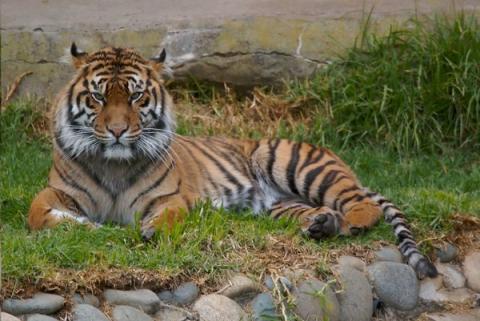The Road to Extinction

From New America Media:
Once in a while tigers make international news, like the white tiger in Las Vegas that mauled illusionist Roy Horn of Siegfried & Roy, or the one that killed a teenager at the San Francisco Zoo. Most of the time, though, the news is about tigers being eaten by man.
The latest involves a restaurateur in Hanoi arrested for selling tiger meat. She has been arrested before and served time in jail, but the trade proves too lucrative – $1,000 per 100 grams of tiger meat -- to give up, especially now that there are but a few tigers left in the wild. For poachers a tiger could fetch as much as $10,000, and its meat, organs, bones, and skin are sold in restaurants and specialty shops for 10 times the price. As the tiger population dwindles, demand for tiger is at an all-time high.
Indeed, if there is a cultural matrix in East Asia, it is the longing for what the Chinese call Ye-Wei, or “wild taste.” A decade ago, I visited Vietnam's border with China at Lang Son. I watched as hundreds of Vietnamese carried baskets of monkeys, pangolins, snakes, and a variety of exotic birds in rattan cages. On the way back, their baskets held electric fans, water pumps, rice cookers, farm tools, TVs, VCRs, jeans and T-shirts. As one young man put it, "I can always sell forest animals to China. They buy everything we have. They have a big appetite for wild taste."
The once ferocious tiger has been reduced to a mere commodity, to be farmed and poached, collected for its parts, and made into balms, pills, soaked in wine. Statistics on the amount of wildlife being eaten are not known, but there are some local guesses. The China Wildlife Conservation Association estimates that in Guangdong province alone, 50 tons of wild frogs, 1,000 tons of snakes, and several thousand tons of wild birds are consumed in stores and restaurants each year, not to mention badgers, bats and other mammals.
It certainly isn't practical, but neither are our eating habits. According to Jared Diamond in his book Guns, Germs and Steel, an acre of land can feed 10 to 100 times more people through farming than through hunting and gathering. Wild animals that haven't already been tamed thousands of years ago, Diamond noted, will not be tamed now, because of their relatively low nutritional value compared to the time and resources necessary for domestication.
Ye-Wei is therefore a culture of nostalgia, a way of life born of necessity long ago that is taking on renewed vigor in a modern, materialistic East Asia. Viagra, after all, works better than tiger penis, but if you can afford a tiger penis you are the king of the modern jungle. Those monkeys sitting on the Vietnamese porters' backs are there because a growing army of nouveaux riches with disposable income want them. A pound of civet cat sells for around $12, or 10 percent of an average worker's monthly salary; monkey meat brings four times more. In Vietnam, nearly three out of four tigers are killed for Chinese medicinal purposes. A poached tiger therefore can save a poor farmer and his family from a life of destitution.
Once the tiger hunted man. Now it has become high-end gourmet food. As it is, there are far more tigers now living in parks and zoos and farms than in the wild, where fewer than 5,000 Siberian tigers live in the northern steppe and some 4,500 Bengal tigers live in the wilderness of South Asia. The captive population of 12,000 tigers in the United States is estimated to rival that of those that still live in the wild.
We burden wild animals with anthropomorphic fantasies, and slay them because we covet or fear what we think they represent. The lion is courageous, the snake is evil, the owl wise, the fox cunning and the tiger -- the tiger, above all -- is majestic, elegant, full of prowess and grace. It inspires awe.
Alas, the tiger's grip on our imagination is also the force that drives it toward its own extinction.
Author Bio:
Andrew Lam is author of "East Eats West; Writing in Two Hemispheres" and "Perfume Dreams: Reflections on the Vietnamese Diaspora."






























































































































































































































































































































